PHUKET: Chas Oldjohn recalls the moment he and his wife Marisa turned the corner onto the bypass road coming from the airport and heard a cry.
He looked out the window of the taxi and saw a woman in the road yelling for help. A motorcycle was down. People were standing at a distance.
Nobody was answering the woman's plea. ''I could hear her screaming for help,'' Chas said.
Chas and Marisa were on their honeymoon and could have probably been forgiven for heading on to their resort in Patong.
But they heard the call, saw the woman looking straight at them, and ordered the taxi to stop immediately.
It was the beginning of a drama that brought together the Australian honeymooners and distressed holidaymakers Simon Ong and Emerin Chan, who come from Malaysia but live and work in Singapore.
The questions raised by these two couples in their analysis of a motorcycle crash deserve answers from Phuket officials.
Answers should come quickly so Phuket can show it remains seriously concerned about the safety of tourists and residents on Phuket's roads.
Simon, 39, a merchant banker, was being evacuated to Singapore this weekend to have operations to put both his broken arms and a shoulder back together.
His face, one eye blood-red, shows how lucky he was to be wearing a helmet.
Chas, 29, a firefighter from Melbourne, and Marisa, a doctor who works in a Melbourne hospital emergency unit, felt compelled to stop.
A few minutes earlier, Simon and Emerin, who works for Microsoft, had taken the right-hand corner and were heading towards dinner in Phuket City.
Without any warning, they encountered a section of the bypass road that was deeply rutted from being remade.
As Simon attempted to move across the rutted zone under repair to a safer surface, the bike hit something, he lost control and they crashed.
In a surreal moment, Emerin recollects coming off the bike then reaching out to try to grab Simon and stop him from sliding on: ''I tried to grab his ankle but I couldn't reach him.''
In a room at Bangkok Hospital Phuket in Phuket City, Simon makes light of the mess his face is in. He attempts a few jokes but admits he is ''numb and a long way from feeling the way i usually do.''
He says he and Emerin are regular visitors to Phuket or Krabi.
''We try to make one trip a year, hire a bike and go find some nice beaches and food,'' he says.
''It was the second day of our trip and unfortunately we had this accident.''
Simon, an experienced rider, had already traversed that stretch under repair once and knew it was likely to be tricky, but wishes there was both warning signage and an alternative route.
Emerin ''You don't see the international signs, the triangle, declaring that you are entering a dangerous area.''
Marisa ''In Australian there would be warnings, and cones to control the traffic.''
Simon ''After dark it must be even worse.''
Chas ''Luckily it was dusk.''
Marisa and Chas quickly moved into action with Marisa checking Simon thoroughly and professionally while Chas puzzled why nobody had stopped to help: ''We saw a few people standing by the road.''
Emerin ''In Singapore, people rush to help. Here, they just seemed to be taking videos.''
When a charity foundation paramedic arrived, Chas asked him for the proper kit to assist an injured person and was surprised to get a less than positive response.
Chas ''Our taxi driver wasn't prepared to stop until we got upset and the guy who arrived in the pickup with the canopy did not have the proper equipment or the right training.''
Marisa ''We had a look at what was going on, stabilised Simon, then waited for an ambulance.''
Although the ambulance was much better equipped, Chas thought it was strange that the team on board were keen to talk to him rather than Marisa, the doctor at the head of the patient.
Emerin found more problems when she went for a police report of the crash at Phuket City Police Station, and wisely took her own translator.
The message she got, she said, was that they were ''foreigners'' and had been riding dangerously.
Emerin ''Bloody hell, if I was a Thai he would be helping me, not giving me a difficult time. We were both wearing helmets and riding carefully.''
The two couples agreed that the lack of warnings about the condition of the road was a major oversight.
Motorists and riders need to be told about all roadwork because of the danger it presents. This is not the first crash on the remade stretch of the bypass road.
They also agreed that Thais do not seem inclined to help readily in this kind of situation - perhaps that's not true of all Thais. But certainly, people in Singapore and Australia are generally inclined to help more speedily than people on Phuket, the couples agreed.
More training and better equipment are required for the paramedics first on the scene. Chas and Marisa are offering to help with some guidance if it's wanted before they fly home.
They also note that fullface helmets remain difficult to find, even though they're the best precaution a motorcycle rider can take, apart from hiring a car instead.
Both couples were keen to stay in touch and wanted to tell their stories to help make Phuket safer for others. The rest is up to the authorities on Phuket.

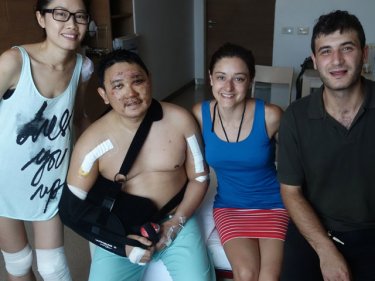








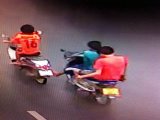
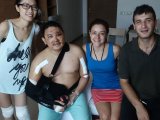




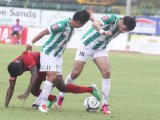


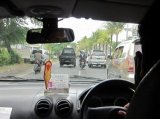




A thoughtful, well written & interesting article which accurately sums up the road problems encountered in Phuket.
There are no black spot or danger warning signs at notorious accident spots; nor at areas where there is either road damage or road repairs being undertaken.
Despite the large numbers of foreign tourists using the roads, the signage is haphazard & unclear, if existing at all.
Just as the rip tide warning signs along the main beaches have been improved, so now is there a real need for authorities to improve road signs.
Posted by Logic on July 14, 2013 21:58
Editor Comment:
And perhaps even give us updates on the road toll statistics.